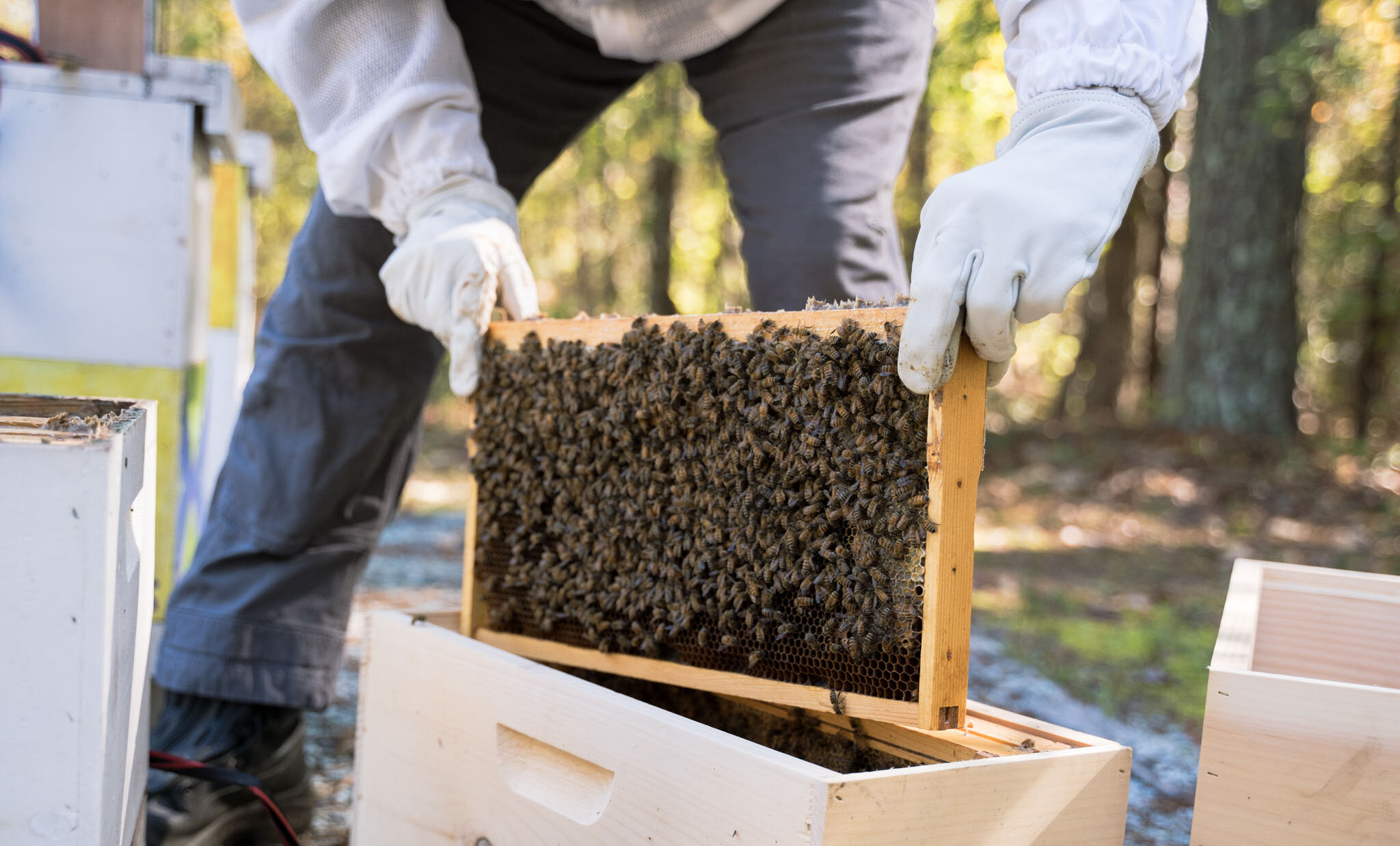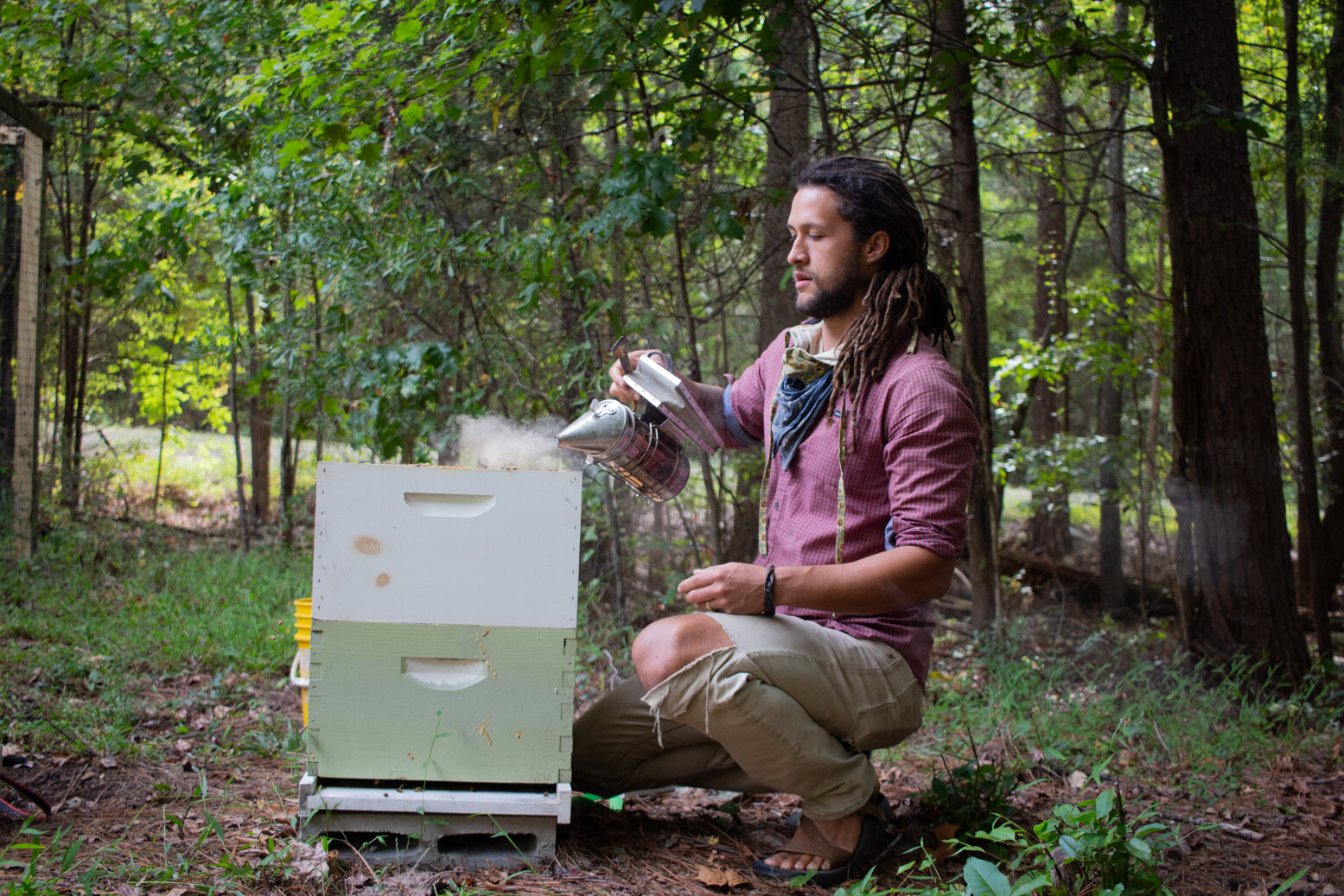Do beekeepers get stung often?
When I first got my first beehive, I was eager to be the type of beekeeper who could confidently inspect their colony without any equipment.
After my first inspection I thought, “Hey that was easy! I guess I’m ready to do the next one without a bee suit!” And what happened on the second inspection? I accidentally crushed a worker bee as I was inspecting the hive and, in defense, one of her sisters stung me.
It was totally my fault.
How’d it feel? It hurt, a bit. Though luckily there was very little swelling.
The moral of the story is that everyone needs to respect bees, especially beekeepers. However, there’s no need to fear being stung. With some common sense, it’s easy to stay safe around bees.
At Buddha Bee Apiary, we get asked a lot of questions about bee stings from folks interested in our honeybee hosting program. Everything from whether they hurt to how often beekeepers get stung. In this blog, we try to break it down.
Do bees sting beekeepers?
Yes. It happens. Bees do sting, occasionally. However, they usually only sting if they feel threatened. Remember, most honeybees are not aggressive. They are defensive. A honeybee will die when it stings, which means it only stings as a last resort. A skilled beekeeper can avoid being stung when inspecting a hive. Below, we cover how.
Do bee stings hurt?
It depends on the location of the sting, how long the stinger is left in for, and of course, on the person. They certainly can hurt. For people who are allergic, bee stings can be extremely dangerous and should be taken seriously.
Oftentimes, the first few stings hurt the most. According to a study from the Yale School of Medicine, exposure to the key toxic component in bee venom can induce immunity. That explains why many beekeepers are simply "used to" stings.
How do beekeepers avoid getting stung?
The number one way to reduce your chance of being stung is to never swat at a bee. Here are some other strategies beekeepers employ to avoid stings. We follow these tips ourselves during our bee farm tours.
1. Wear protective gear
Some beekeepers don't mind a few stings on their hands, some just wear a veil to stop stings on their face, and others want to avoid any sting at all costs. Depending on the beekeeper's comfort level—and the temperament of the hive—they may wear a veil and gloves, jacket, or a full suit.
For example, someone who has been keeping bees for years and has a docile hive may just want to wear gloves and a veil when handling their own bees. But if they needed to remove a large colony from a tree? Well, they'd probably want to wear a full suit in that case.
Gloves are a useful way to avoid stings. Some beekeepers choose not to wear them, because they can limit dexterity.
If you’re inspecting a hive or want to get near one, make sure:
Your suit or jacket’s zippers are completely closed
Your veil has no holes in it
Your pants are tucked into your socks
2. Use a smoker
Beekeepers use smoke to calm honey bees and mask their pheromones, the chemicals they use to communicate. Beekeepers will puff some smoke into a hive prior to opening it up to let the bees know they're coming in and keep them docile.
When a bee stings, it sets off an alarm pheromone to tell the other bees she’s in trouble. So when a beekeeper is stung, they'll often puff smoke on the site of the sting to cover up the smell of the pheromone.
The Buddha Bee Apiary founder, Justin, using a smoker while inspecting a hive.
3. Work with the weather
Do you ever have one of those days where the weather gets you grumpy? Bees are the same way. It's best to work with bees on a clear, sunny day. To avoid stings, beekeepers leave their hives alone during cold, windy, and rainy weather. It's also best to only open your hives when there’s plenty of daylight left. Beekeepers never open their hives at night.
4. Place your hive in a smart location
In the last three tips, we covered strategies beekeepers employ when opening up their hives. However, sometimes stings can occur even when you're not actively inspecting a colony. To avoid this, you should place your hive in a smart location. In other words, avoid locations where people are often walking. A spot with partial shade in the back of your yard is usually a good bet. Right by your driveway where you have to walk to get to your car? Not so much.
5. Don't walk in front of hive
It can be relaxing and extremely interesting to watch your hives, but always stand closer to the back of the bee box. If you watch a beekeeper performing an inspection, you'll notice they never stand directly in front of the entrance:
Always stand next to or behind a beehive to avoid stings. Never directly in front.
Think of the front of a hive as the runway at an airport. This is where bees are flying in and out of, so give them plenty of space. Unless you're performing an inspection or are an experienced beekeeper, we recommend staying at least 5 or 6 feet away from your hive.
6. Stay calm and never swat
If a honeybee is on you, it's because it's curious. Keep your Zen. Just hold still, take a breath and let the bee explore for a bit. Once it realizes you're not a flower and have no sweet nectar or sugar water to offer it, it will go peacefully on its way. Most bee stings happen when a person gets scared and begins to swat. These quick motions will cause the bee to become defense. If the bee continues to bother you, just walk away from it slowly. Eventually, it'll move on.
Why do bees not sting beekeepers?
You may have seen some beekeepers work without any protection and experience no stings. This is because they work carefully to avoid crushing bees and setting off their alarm pheromones.
They may also have built up experience with a particular hive, and thus they're aware of how those bees generally behave. The same beekeeper wearing no safety equipment with one hive would likely put on a jacket to work with a hive that's totally new to them.
Here's another way of thinking about it. If you have a dog, you are probably very good at reading it's behavior. You may be comfortable petting your own dog, even if it's barking. However, unless you're a professional dog trainer you wouldn't want to touch a stranger's dog without asking first.
The same logic applies to bees. Beekeepers can "read" their bees.
What to do if you're stung be a bee
First things first, if you believe you may be allergic you should consider having an EpiPen for emergencies. If you're stung, don't hesitate to seek medical attention.
If you're not allergic, just use a credit card or knife to carefully remove the stinger. This will prevent the venom from entering you. Don't try to use your fingers to pick the stinger out. You may squeeze the venom sack and may the pain worse.
If you're experiencing mild symptoms, you can take an antihistamine to lessen the pain and itching. If you have an essential oil with an anti-inflammatory property handy, like lavender oil, you can also apply that to the area. At the very least, you’ll smell good!
Final thoughts on beekeepers getting stung
As with all animals, it's important to respect bees. At Buddha Bee Apiary, we host beehives in backyards. The first thing we go over with our hosts is safety. If you keep a safe distance from their colony and don't swat at them, you likely never have to worry about being stung. To keep bees healthy, beekeepers have no choice but to open up their hives. If you're a new beekeeper, always wear your protective equipment. This doesn't make you any less of a "real" beekeeper. As you get more comfortable, you may choose to use less equipment but don't rush it!



